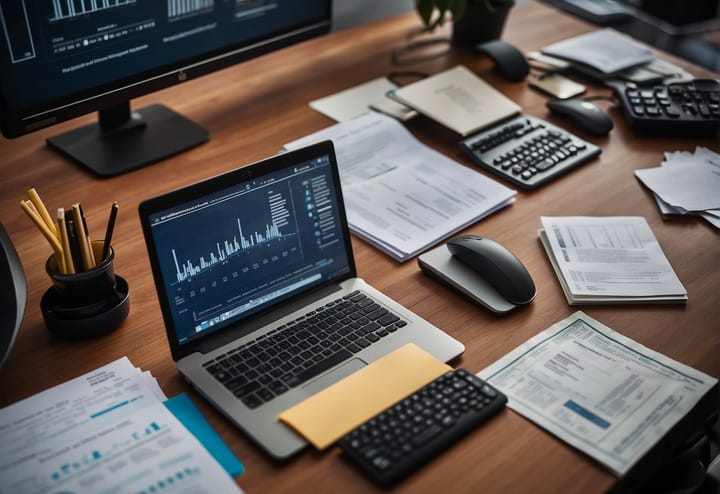What are Futures Exchanges?
Discover the role of futures exchanges in hedging, speculation, and price discovery. Learn about key players like CME and NYMEX in global finance.

Futures exchanges are financial marketplaces where traders can buy and sell futures contracts. A futures contract is an agreement to buy or sell a specific asset, such as commodities, currencies, treasury bonds, or financial instruments, at a predetermined price and date in the future.
The primary purpose of futures exchanges is to provide a platform for hedging and speculation. Hedging involves using futures contracts to offset the risk of price fluctuations in the underlying commodity or asset. For example, a farmer may use futures contracts to lock in a crop price to protect against price volatility.
On the other hand, speculation involves betting on the future price movements of the underlying asset. Traders who expect the asset price to increase will buy futures contracts, while those who expect the price to decrease will sell futures contracts.
Futures exchanges play a crucial role in facilitating price discovery and liquidity in the market. Price discovery refers to determining the fair market value of an asset based on the interactions of buyers and sellers in the futures market. Liquidity is the ease with which traders can buy or sell futures contracts without causing significant price movements.
There are several well-known futures exchanges around the world, including the Chicago Mercantile Exchange (CME), London International Financial Futures Exchange (LIFFE), and Tokyo Commodity Exchange (TOCOM). These exchanges provide a regulated and transparent environment for trading futures contracts.
In summary, futures exchanges are financial marketplaces where traders can buy and sell futures contracts. They serve the purpose of hedging against price fluctuations and speculating on future price movements. By providing price discovery and liquidity, futures exchanges play a vital role in the global financial system.
Key Takeaways
- Futures exchanges provide a platform for trading standardized futures contracts.
- They serve as efficient and regulated markets for buyers and sellers to trade commodities, financial instruments, and other assets.
- Futures exchanges facilitate price discovery and risk management through transparent and competitive trading.
- Participants in futures exchanges include hedgers, speculators, and arbitrageurs.
- Meaningful futures exchanges include the Chicago Mercantile Exchange (CME), New York Mercantile Exchange (NYMEX), and Intercontinental Exchange (ICE).
Recap of the importance and value of futures exchanges in the financial market
Futures exchanges play a crucial role in the financial market, providing a marketplace for trading a wide range of commodities, financial instruments, currency futures, and other assets. Here are some key points to understand their significance:
- Standardized Contracts: Futures exchanges facilitate trading standardized contracts that specify the delivery of an asset at a predetermined future date and price. These contracts help establish a level playing field for all participants.
- Price Discovery: By bringing together many buyers and sellers, futures exchanges enable price discovery. Transparent and competitive trading on these platforms helps determine fair prices for the underlying assets, benefiting market participants.
- Risk Management: Futures exchanges are essential risk management tools for businesses and investors. Hedgers use futures contracts to protect against price volatility and manage their exposure to fluctuations in commodity prices, interest rates, and currencies.
- Market Liquidity: The liquidity of exchanges allows participants to enter positions, and this liquidity attracts a diverse range of market participants, including speculators and arbitrageurs, who further contribute to the efficiency and stability of the market.
- Regulation and Oversight: Futures exchanges are regulated by financial authorities to ensure fair and transparent trading. This oversight helps maintain market integrity and protects investors' interests. The CFTC regulates futures exchanges in the USA through the Commodity Exchange Act.
Some notable futures exchanges include the Chicago Mercantile Exchange (CME), known for its extensive product offerings; the New York Mercantile Exchange (NYMEX), which focuses on energy and metals markets; and the Intercontinental Exchange (ICE), which offers a diverse range of futures and options contracts.
In summary, futures exchanges are vital for trading standardized contracts, facilitating price discovery, managing risk, and contributing to financial markets' overall efficiency and stability.
How Futures Exchanges Work
Membership and access to the exchange
Regarding futures exchanges, the first step is to become a member or have access to the exchange. Membership grants you the ability to trade a contract directly on the exchange, while access allows you to trade through a registered broker who is a member of the exchange.
Establishing an account with a registered broker
You must establish an account with a registered broker to trade on a futures exchange. Brokers act as intermediaries between traders and the exchange, executing trades on behalf of their clients. Choosing a brokerage account with a reliable and reputable broker that meets your trading needs is essential.
Clearing and settlement functions
Futures exchanges also play a vital role in the clearing and settling trades. Clearing refers to the process of matching buy and sell orders and determining the obligations of each party involved. Settlement is the final stage, where the exchange ensures that the obligations of one party or buyer and seller are fulfilled.
During this process, the futures exchange acts as a central counterparty, guaranteeing the performance of each contract traded. This reduces counterparty risk for individual investors and ensures the market's integrity.
By facilitating the clearing and settlement functions, futures exchanges provide transparency, efficiency, and stability to experienced investors due to the trading cash settlement process. They enforce standardized rules and regulations while maintaining a level playing field for all participants.
In conclusion, futures exchanges provide a platform for trading standardized contracts, allowing market participants to hedge against price fluctuations or speculate on future price movements of a particular commodity or commodity. Understanding the membership and access requirements, establishing an account with a registered broker, and being aware of the clearing and settlement functions are essential to participate in futures trading effectively.
Benefits of Futures Exchanges
Facilitating quick and safe trading of commodities
When you participate in futures exchanges, you gain access to a platform that enables you to buy or sell commodities quickly and securely. These exchanges provide a structured marketplace where traders can execute transactions efficiently. Proper regulations and oversight minimize the risk of fraud and manipulation, ensuring a fair and transparent trading environment.
Providing sellers and buyers with price certainty
One of the significant advantages of futures exchanges is the ability of most participants to lock in prices for future delivery. This feature is precious for producers and consumers of commodities who want to protect themselves from price volatility. By entering into a futures contract, sellers and buyers can establish the transaction's price, providing them with certainty and reducing the impact of price fluctuations.
Standardization for increased participation and liquidity
Futures exchanges operate through standardized contracts, specifying the underlying commodity's quantity, quality, and physical delivery and terms. This standardization eliminates uncertainties and ensures that all participants are trading uniformly. As a result, futures markets attract a broader range of participants, including hedgers, speculators, and arbitrageurs, which increases market liquidity and efficiency.
By bringing together a diverse group of market participants, futures exchanges facilitate price discovery and stock trading by allowing buyers and sellers to determine fair market value based on supply and demand factors set by price. The transparent nature of futures markets enables traders to assess market sentiment and make informed trading decisions.
In summary, futures exchanges offer several benefits, including facilitating quick and secure trading, providing price certainty, and promoting increased participation and liquidity through standardization. These advantages make futures exchanges a crucial component of global financial markets, giving traders the tools to manage risk and take advantage of market opportunities.
Notable Futures Exchanges
CME Group
CME Group is a well-known and influential futures exchange in the United States. It offers futures contracts in various asset classes, including commodities, currencies, interest rates, and equity indexes. With its strong reputation and extensive offering of derivatives products, CME Group attracts participants worldwide, including institutional investors, commercial hedgers, and individual traders. The exchange provides a transparent and regulated marketplace where buyers and sellers can trade futures contracts based on their expectations of future price movements. CME Group also offers clearing and settlement services, ensuring the integrity and efficiency of the trading process.
Euronext
Euronext is a leading pan-European exchange group that operates markets in several European countries. It offers futures and options contracts on various underlying assets, including equities, equity indexes, commodities, and interest rates. Euronext's diverse product offering and presence in key European financial centres make it an attractive choice for market participants seeking exposure to European markets and financial instruments. The exchange provides a robust, regulated trading platform and clearing and settlement services.
These exchanges offer various futures contracts and provide a regulated marketplace for participants to manage risk and speculate on future price movements.
Futures exchanges facilitate price discovery and risk management for various financial instruments and commodities. By offering a transparent and regulated marketplace, these exchanges allow participants to hedge their positions and capitalize on price changes, contributing to the overall efficiency and stability of the global financial system.
Historical Background of Futures Exchanges
Overview of the origins and development of futures exchanges
If you're interested in investments, money and trading, you may have encountered the term "futures exchanges." These exchanges play a crucial role in facilitating the trading of futures contracts, which are agreements to buy or sell an asset at a predetermined price at a specific future date.
Futures exchanges have a long and rich history that dates back centuries. The origins of commodity futures trading can be traced back to ancient civilizations, where farmers and merchants would agree to the future delivery date of goods at predetermined prices. However, the modern concept of futures exchanges as we know them today took shape in the 19th century.
Important milestones and key players in their history
One of the earliest and most influential futures exchanges was the Chicago Board of Trade (CBOT), founded in 1848. CBOT played a crucial role in standardizing futures contracts and establishing rules and regulations for trading. It was also responsible for introducing innovations such as the first organized futures trading floor.
Over the years, other significant futures exchanges emerged, including the Chicago Mercantile Exchange (CME), New York Mercantile Exchange (NYMEX), and ICE Futures Europe (ICE). These exchanges expanded the range of futures contracts available to investors, covering various asset classes such as commodities, currencies, and interest rate and rates.
In recent decades, electronic trading platforms have revolutionized futures exchanges, allowing faster and more efficient transactions. These platforms provide real-time access to trading, making it easier for investors worldwide to participate in futures markets.
Today, futures exchanges play a vital role in global financial markets, providing a platform for hedgers, speculators, and arbitrageurs. They offer opportunities for investors to manage risk, speculate on price movements, and provide liquidity to the markets.
So, whether you're a seasoned investor or just starting to explore the world of trading and investing, understanding futures exchanges and how they operate can enhance your knowledge, potentially make more money, and open new investment opportunities.


